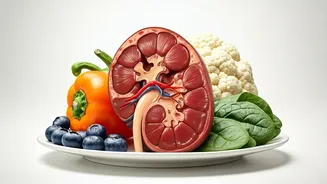Nourishing Your Kidneys
Certain foods play a vital role in maintaining the health of your kidneys, with scientific backing for their benefits. Consider including these options
in your regular diet to promote optimal kidney function. Fatty fish, such as salmon, are rich in omega-3 fatty acids, which have anti-inflammatory properties that can reduce kidney inflammation. These foods also contribute to lowering blood pressure, which is good for the kidneys. Incorporating these foods into your diet supports kidney health and overall well-being. Additionally, various fruits and vegetables like apples and cruciferous vegetables like broccoli contain antioxidants, which are vital for reducing oxidative stress that can damage the kidneys. These nutrients work synergistically to protect and maintain kidney health, offering a natural and effective approach to kidney care.
Embrace Kidney-Friendly Fruits
Including specific fruits in your diet is highly beneficial for your kidney health. These fruits are not only delicious but also support kidney function. Cranberries are known for preventing urinary tract infections, which can indirectly protect the kidneys from damage. Blueberries are another excellent choice, packed with antioxidants that combat harmful free radicals, thus helping to maintain healthy kidneys. Apples, easily accessible, also aid in kidney health, with their rich fiber content that helps detoxify and reduce kidney stress. Integrating these fruits into your daily nutrition provides essential vitamins, minerals, and antioxidants, contributing significantly to your overall health and kidney wellness. By actively incorporating these fruits into your diet, you support your kidneys and create a foundation for enduring health and vitality.
Prioritize Healthy Vegetables
Vegetables contribute significantly to overall health and are particularly beneficial for kidney health. Incorporating specific vegetables into your diet can help protect and improve your kidney function. Broccoli, for example, is rich in antioxidants and vitamins and helps reduce the risk of kidney disease. Cauliflower, another cruciferous vegetable, supports kidney function due to its rich supply of Vitamin C and Vitamin K. Garlic is also very helpful. It provides anti-inflammatory and antioxidant benefits that protect the kidneys from damage. Regular inclusion of these vegetables in your diet is a powerful step towards maintaining healthy kidneys and overall well-being. By focusing on these nutritious foods, you’re making a proactive effort to preserve kidney health and enhance your quality of life.
Foods to Limit or Avoid
While certain foods benefit kidney health, others can contribute to damage, emphasizing the need for dietary awareness. Limiting or avoiding these can protect your kidneys from potential harm. Processed foods are often high in sodium, which can increase blood pressure and strain the kidneys, making it necessary to reduce their consumption. Excessive intake of red meat can overload the kidneys, increasing the risk of kidney damage. Carbonated beverages and sugary drinks, also, are harmful due to their high sugar content, which increases the risk of diabetes and obesity, both of which negatively affect kidney health. It’s essential to be mindful of your food choices and limit items that can lead to kidney-related issues, helping to maintain long-term kidney health.
Sodium and Kidney Function
Sodium plays a crucial role in maintaining blood pressure, directly impacting kidney function. High sodium intake can elevate blood pressure, leading to increased strain on the kidneys. Limiting your sodium consumption can significantly support kidney health. Processed foods, fast foods, and many packaged snacks often have high sodium levels, increasing the risk of hypertension and kidney damage. Reducing your salt intake is an important step towards protecting your kidneys and improving overall health. By being mindful of your dietary choices and reducing high-sodium foods, you can contribute positively to long-term kidney health, lowering the risk of hypertension and promoting kidney function.
The Impact of Phosphorus
Phosphorus is a mineral necessary for various bodily functions, but its excess can be harmful to kidney health. Excessive phosphorus levels can burden the kidneys, particularly if kidney function is compromised. In individuals with kidney disease, the kidneys may struggle to filter out excess phosphorus, which can accumulate in the body. Limiting phosphorus intake, especially from processed foods and certain protein sources, is crucial to maintain kidney health. This proactive approach helps reduce strain on the kidneys, preserving their function and overall health. Careful consideration of phosphorus content in your diet can significantly contribute to better kidney health and overall well-being.



















